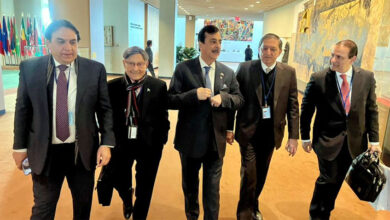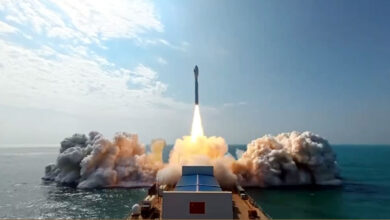American Accusations and CPEC

Aurangzeb Alamgir
The China Pakistan economic corridor (CPEC) is an ambitious project that aims at changing the geo-economic dynamics of Pak-China relations and augmenting the trading activity in the region. It anticipates economic growth, meeting the energy shortfall requirements, employment generation, foreign direct investment, infrastructure development, promotion of tourism and others. CPEC is a multi-billion project which offers a long term investment in Pakistan involving the regional countries as well. However, the project is being challenged by various controversies and external opposition. In this scenario if these challenges are effectively tackled, it may lead to economic interdependence that would be climacteric for peace and economic development for the region.
Most recently, Alice Wells, the US Acting Secretary for the Bureau of South and Central Asia Affairs, criticized CPEC. She claimed that several firms blacklisted by the World Bank have received contracts in CPEC. She further criticized that “the lack of transparency in the CPEC deal and the conditions imposed by China are increasing Pakistan’s debt”. In response, Chinese ambassador to Pakistan Yao Jing has rebuffed US criticism on China-Pakistan Economic Corridor. He said that the US envoy’s statement fully exposed her ignorance on Pak-China relations. He further added that CPEC is a corruption free project and it is win-win for both Pakistan and China.
If we critically analyze the US concerns over CPEC it is obvious that CPEC has increased the US’ concerns because both China and Pakistan will benefit- economically and strategically. CPEC has put the two countries, China-Pakistan, on a permanent course, and the direction would help them to surpass their economy and possible potential. However, CPEC would certainly influence the “Rising India” that is not in the interest of the US because CPEC is an extension of BRI that was launched by China in 2013. BRI includes more than 152 countries and China is heavily investing in infrastructure development in these countries. CPEC, therefore, is massively achieving its objectives.
Arguably, CPEC has emerged as the next battleground for the United States and China’s economic rivalry. Both countries’ warnings and counter warnings are coming at a time when Pakistan is looking for investment from both countries. American criticism on CPEC seems coherent in the context of US China trade war as the United States and China are the world’s two largest economies; the US has a larger nominal GDP, whereas China has a larger GDP when measured in terms of PPP. Likewise China is the world’s largest exporter and the United States is the world’s largest importer. They have so far been important pillars for the global economy. Moreover, while the United States has assured Pakistan that it is greatly enhancing trade with the country, it’s unlikely that Islamabad will win Washington’s economic support at a level even close to Beijing’s financial commitments. However, it remains to be seen if Washington can allow Beijing to completely wipe out its ability to continue its BRI project.
While in the regional context, the notion of CPEC is indeed the promotion of regionalism and globalization. Globalization can well be defined as global interconnectedness, which is achieved through regional connectivity. The regional connectivity in turn is achieved through the development of communication network between two or more states and even within the boundaries of a state. In summary, the essence of globalization is interconnectedness, achieved through world-wide, “Widening, deepening and speeding up” of communication. In fact, CPEC is a project which would be the initiator for the long-term regional integration, not between Pakistan and China, but in South Asia and various regions of Asia. This is possible only once the regional states; energy deficient and energy efficient correctly re-asses their future priorities. A well thought-out and deliberated economic integration would pave the way for a wider regional peace, greater political integration and economic prosperity for all member states.
Regardless of US criticism, it is obvious that, CPEC is a project which would be the initiator for the long-term regional integration, not between Pakistan and China, but in South Asia and various regions of Asia. This is possible only once the regional states; energy deficient and energy efficient correctly re-asses their future priorities. A well thought-out and deliberated economic integration would pave the way for a wider regional peace, greater political integration and economic prosperity for all member states.





